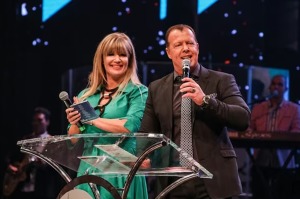Pro-life activist at CPAC slams 'anti-woman culture' that encourages abortion

Pro-life activists slammed the “anti-woman culture” that causes women to believe that having a baby will prevent them from achieving their life and career goals during a panel at the Conservative Political Action Conference Saturday.
Moderated by the New York Post’s Kelly Jane Torrance, the "Hard Questions for the Hard Cases: How to Defend Life" panel included Emily Berning, the CEO of the nonprofit pro-life organization Let Them Live; Alison Centofante, the director of external affairs at the pro-life group Live Action; and Rep. Michelle Fischbach, R-Minn.
Torrance acted as devil’s advocate throughout the panel, asking the passionate pro-life activists to respond to some of the most common arguments from abortion supporters.
She acknowledged widespread opposition to third-term abortions among Americans who describe themselves as pro-choice but noted that “tougher questions come at the beginning or when there are medical issues.”
Responding to an inquiry about what to say to mothers who are seeking abortion because they find themselves in a difficult financial situation or think they are too young or because they are not in a relationship, Berning stressed that “circumstances are temporary and abortion is permanent.”
Berning also took issue with the “anti-woman culture that’s saying if you have a baby, you can’t do anything. You can’t do it. You have to kill your child to be successful. That is what the culture is telling women and we have to be so opposite of that.”
She then described the work of her organization, Let Them Live, where she and her staff counsel pregnant women and explain that “those temporary circumstances do not define you as a mother, they do not define you as a person, and we will help you get out of that so that you can make a life-affirming decision.”
“Politics is downstream from culture, so if we expect to change anything, we … need to change the culture and that starts with letting women know that we are here for them,” she added.
Torrance also referenced comments made by actress Michelle Williams, who, at last year’s Golden Globe Awards, said she didn't think she would've had the career she had if she didn't have an abortion at a young age.
Berning rejected that argument: “It’s not one or the other. … Why does our society say it has to be one or the other? You either choose your education or your child. You either choose paying for your rent or you choose your child.”
“It does not have to be a one or the other situation,” she asserted. “Women are strong enough to do what they want to do in life and have a child if they choose.”
Asked to weigh in on exceptions to abortion bans if the life of the mother is at risk, Centofante explained that “we have done so much research talking to the world’s leading OB/GYNs” who say that “the goal is to always, should be, to save them both.”
Centofante added, “if that baby needs to be separated from that mother, the answer … is early delivery, early induction or C-section, not dismembering that child.”
“There is no need to go in and intentionally kill that child,” she continued. “An emergency C-section to help that mother can be done in under an hour or two, a third-trimester abortion that occurs after 24 weeks when these high-risk cases can develop takes two to three days. So you tell me what’s safe.”
When Torrance asked what should be done if a doctor informs a mother that her baby would be born with “serious, serious disabilities or serious developmental issues” where “the child will either die very quickly or will have a horrible, burdensome life,” Centofante maintained that the child “is a human being worthy of our legal protection.”
Torrance brought up a hypothetical situation in which a doctor says to a mother, “this child’s going to have a miserable life” because of Down syndrome or another condition that will “keep them from having a fulfilled life.”
In response, Berning pushed back on that way of thinking: “It’s no one person’s job to decide for another person if their life is fulfilled.”
“Health professionals need to speak up and speak out and be done with abortion,” Centofante asserted as she recounted how during her pregnancy, a doctor asked her if she wanted to do prenatal testing to determine if her child had Down syndrome. She lamented that “90% of babies diagnosed with Down syndrome in the United States are killed.”
“When a pregnant woman walks into Planned Parenthood, they see money,” Centofante contended. When they walk into … Let Them Live, Live Action, a pregnancy resource center, we’re like, ‘Let’s just help you.’”
Centofante alleged that the reason abortion is so intertwined in politics and culture is because Planned Parenthood receives government funding. “Pull their taxpayer funding and you will see the pro-life movement step in to take care of women and the abortion industry fade out. It’s because we’re propping it up with our own money.”
Torrance then asked the panelists how one can convince atheists or agnostics who don't have an “easy in to being pro-life” that results from practicing a religion to oppose abortion.
“Science is showing us so much about the humanity of the unborn,” Fischbach responded.
“I have five grandchildren and another on the way and when my children were born, you had those little grainy ultrasounds,” she recalled. “Now you’ve got the 4D and you can see if the baby’s smiling.”
“The pro-life issue is not just a religious one,” Berning added. “It doesn’t have to be religious, supporting women … supporting unborn children; it’s just something we should do as human beings.”



























